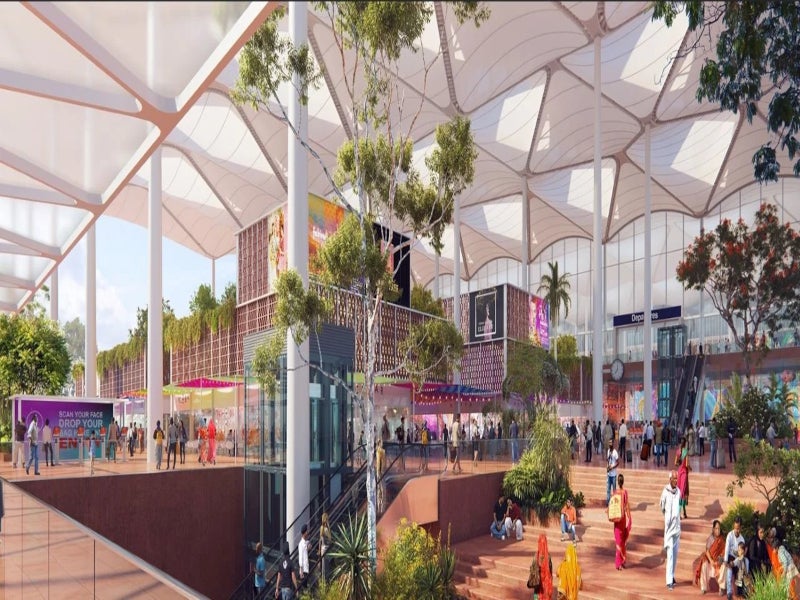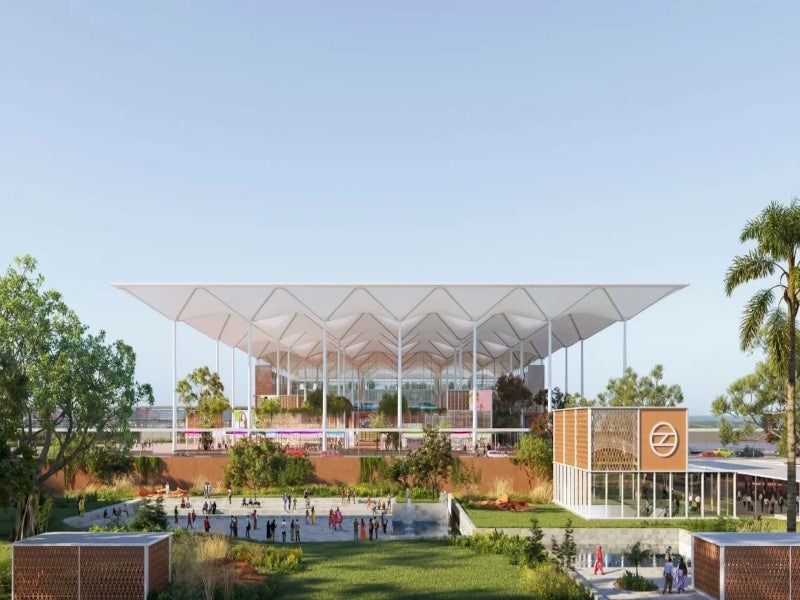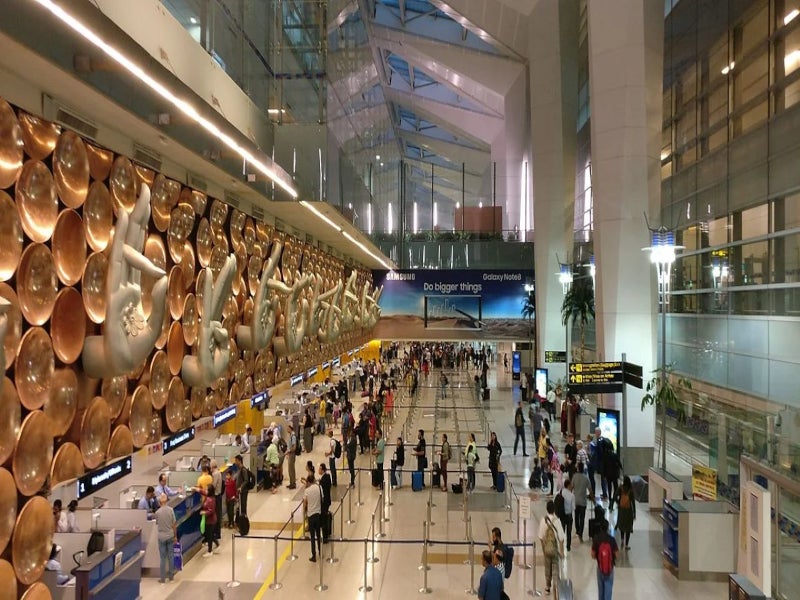Noida International Airport (NIA), also known as Jewar Airport, is a greenfield airport being built in Jewar, Greater Noida, in Uttar Pradesh, India.
The airport is expected to be India’s largest airport and the fourth-largest airport in the world upon completion.
It will help relieve congestion at the Indira Gandhi International Airport (IGI) and serve the fast-developing industrial region between Delhi and Agra.
It will also serve the Western UP pockets and the neighbouring states of Haryana, Uttarakhand, and Rajasthan.
The airport will be developed in four phases. The first phase of construction will involve an investment of approximately $730.5m. It will accommodate up to 12 million passengers annually.
The foundation stone for the airport was laid in November 2021. Commercial operations at the airport are expected to commence by the end of April 2025.
Location
The airport will be located approximately 72km away from IGI, and 40km from Noida, Ghaziabad, and Faridabad. It will span a total area of 5,000ha.
The airport will be connected to tourist destinations such as Vrindavan, Mathura, and Agra by Yamuna Expressway.
Noida International Airport development details
The land acquisition for the airport has been funded by the state government and Yamuna Expressway Industrial Development Authority (YEIDA).
YEIDA was the nodal authority for the airport project until Noida International Airport (NIAL), a government-owned entity responsible for overseeing the development of the airport at Jewar, was appointed to supervise the airport development work.
The State Bank of India granted the final credit sanction for Rs37.25bn ($510m) to Yamuna International Airport (YIAPL), a special purpose vehicle formed for the development, operation, and maintenance of the airport, in June 2021.
YIAPL received the final approval for the masterplan of the airport from NIAL, Directorate General of Civil Aviation, Airports Authority of India, Bureau of Civil Aviation Security and necessary environmental authorities in August 2021.
The master plan was prepared in collaboration with the aviation consultants Landrum & Brown and experts from Zurich Airport International.
The master plan is designed to meet the anticipated demand over the 40-year concession period.
Noida International Airport details
The first phase of development involves constructing a new 101,590m2 passenger terminal complex, 3,900m north runway, taxiways, aircraft parking areas, an air traffic control tower, cargo facilities, and ancillary buildings, covering more than 1,334ha.
Phase I will also include the construction of a 37,000m² fuel farm having three fuel storage tanks, each with a capacity of 3,300m3, a 40-acre general aviation maintenance repair and overhaul centre, and real estate development on 167 acres.
The second phase of development will involve constructing an additional terminal and airfield infrastructure, including a second runway, to boost capacity to 30 million passengers per year.
After completion of four phases, the airport will be able to serve 70 million passengers per year.
The airport will have 489,700 aircraft movements per year, 186 aircraft parking stands, a 4,150m south runway, and a 386,410m2 second passenger terminal.
Both terminals will be connected by an interterminal connector.
The airport will have eight fuel storage tanks, each with a capacity of 6000m3, spanning an area of 56,000m2 by the end of all phases.
In addition, it is expected to be an air cargo gateway for north India with an integrated multimodal cargo hub.
Noida International Airport design
The design of the airport’s terminal features a central landscaped courtyard, inspired by a haveli, for improved ventilation and daylight, which will help in reducing energy costs and carbon dioxide footprint.
Campus landscaping serves both aesthetic and practical purposes.
Local design elements include steps at the terminal forecourt reminiscent of the ghats of Varanasi and Haridwar, welcoming visitors.
A wavy, white, translucent roof symbolises the region’s rivers while intricate ornamental lattice screens reflect Indian architecture. The airport will offer a grand entry to UP.
Noida International Airport facilities
The baggage handling system at the airport will be incorporated by high-performance VarioTray conveyor technology to deliver luggage fast and reliably.
The landscaped forecourts for both terminals will be connected to a single ground transportation centre (GTC), a multimodal transit hub.
The GTC will be a unique, multilevel building centrally located to provide a hassle-free experience and seamless transfers between terminals and various transport modes for passengers, visitors, and employees.
It will have stations for high-speed and metro trains, taxi and bus services, private parking, and a sizable concourse area with retail shops, dining establishments, and lounges.
The airport will also feature an innovative market walkthrough concept, a first in India, which will enhance domestic shopping, featuring a wide selection of international and Indian brands.
An innovative airport hotel will be developed at NIA. The hotel will feature intelligent technology such as smartphone access, online check-in and check-out, and instant room allotment.
It will cater to global leisure and business travellers with more than 220 well-appointed rooms, banquets, dining, and wellness spaces, including a modern fitness centre.
Noida International Airport digitalisation
NIA will become the first digital airport in India. It will offer contactless hassle-free and paperless services at all the checkpoints, in line with the DigiYatra Policy of the central government.
The passengers will undergo automatic digital processing based on the facial recognition system at the checkpoints, following the one-tier verification.
The facility will also extend to self-bag drop and check-in, using facial recognition.
The digitalisation will help in decreasing the hassle of printing tickets and boarding passes and locating them at various checkpoints.
It also helps passengers to avoid long lines for ID verification.
Sustainability features
The new airport aims to achieve Leadership in Energy and Environmental Design Gold standard certification and carbon net-zero operations.
The NIA master plan designated 8ha for a forest park using trees from the project site, providing leisure and recreational space for passengers and visitors.
The park will focus on health, fitness, and nature, aiming to be a sustainable green area.
NIA intends to preserve native species and maintain a nature-positive approach throughout the airport’s development.
Additionally, NIA is committed to providing infrastructure for 100% electrically powered vehicles at the airport in phases.
Contractors involved
Swiss airport operator Flughafen Zurich signed a concession agreement with the Uttar Pradesh Government for the construction and management of the new airport in October 2020.
Flughafen Zurich formed YIAPL in January 2020.
A consortium of Haptic Architects, Nordic, Grimshaw and STUP was selected for the airport design while PwC was appointed to prepare the techno-economic feasibility study for the project. Jacobs was contracted to provide programme management services to the Noida airport.
NIA selected ICAD Holding as its master system integrator consultant for digitalisation and partnered with Wipro, an Indian IT company, which will serve as a subconsultant to ICAD.
Indian Oil Skytanking was given the 30-year concession to design, build, and operate fuel infrastructure in December 2021.
The engineering, procurement, and construction contract of the airport was awarded to Tata Projects in June 2022 by YIAPL.
Siemens Logistics was selected to design, operate and maintain the departure and arrival baggage handling system for the airport.
Roseate Hotel, owned by Bird Group, will construct an airport hotel for the passengers.
Air India SATS was awarded the development of a multimodal cargo hub at the Noida airport.
In February 2024, NIA and Bharat Petroleum Corporation signed an agreement to lay a dedicated aviation turbine fuel pipeline from BPCL’s Piyala Terminal to the tank farm at the airport.
NIA awarded the retail and duty-free concession to a consortium of Heinemann Asia Pacific and BWC Forwarders in May 2024.
Heinemann will operate the duty-free section while BWC Forwarders will manage domestic retail and international duty-paid retail.






